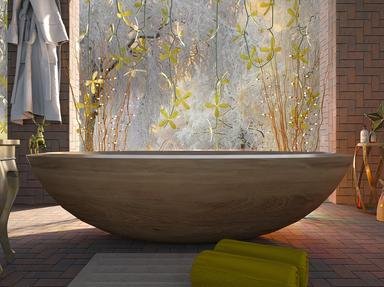Quiz Answer Key and Fun Facts
1. We take bathing more or less for granted. Many ancient civilizations show evidence of plumbing and running water. But which one is most famous for the large, elaborate public baths built by its rulers?
2. When I take a bath, I usually use soap to help myself get clean. But baths were invented before soap became popular. What did the ancients often use in place of soap?
3. There is a lot of controversy about who invented soap, but which people were the first to use it regularly for bathing?
4. The Dark Ages rolled around, and bathing in Western Europe fell out of fashion for a long time. What do some people believe was the cause of people not bathing regularly?
5. Okay, so people didn't bathe very often during the Dark Ages. It is estimated that the average person bathed how often?
6. Advances in plumbing and changes in fashion caused interest in bathing to be renewed in the 19th century. One man, remembered as an arbiter of fashion and a friend of King George IV, is often given credit for making bathing fashionable again, at least in the upper levels of British society. Who was he?
7. Whenever I take a bath, I usually not only wash my body, I also wash my hair. I use a special preparation called shampoo to clean my hair. From which language do we derive the word shampoo?
8. There are other ways of getting clean besides taking a bath in a tub, the most popular being a shower. In which country did showers in the home first become popular with ordinary people?
9. Whether you're taking a bath or a shower, you have to be careful. What is the most common danger associated with bathing?
10. Most Americans bathe or shower every day, some people more than once a day. According to most dermatologists, is this a good idea?
Source: Author
daver852
This quiz was reviewed by FunTrivia editor
LeoDaVinci before going online.
Any errors found in FunTrivia content are routinely corrected through our feedback system.


